In a year that is finally bringing tuning into music tech headlines, here’s a tool from ODDSound and Richard James that promises to help – and it’s free to get started. Let’s talk to the developers.
Tuning is an essential element of music – it’s just our tools that are limited. So if you want to tune your synths to a tuning from most of the planet’s musical cultures, or a historical tuning, or a mathematical or acoustic solution that fits your music, or something more experimental – your solutions are pretty fragmented. Some soft synths do have great facilities for editing and applying tuning, but support is still spotty, and it’s harder still to sync up different software and hardware instruments.
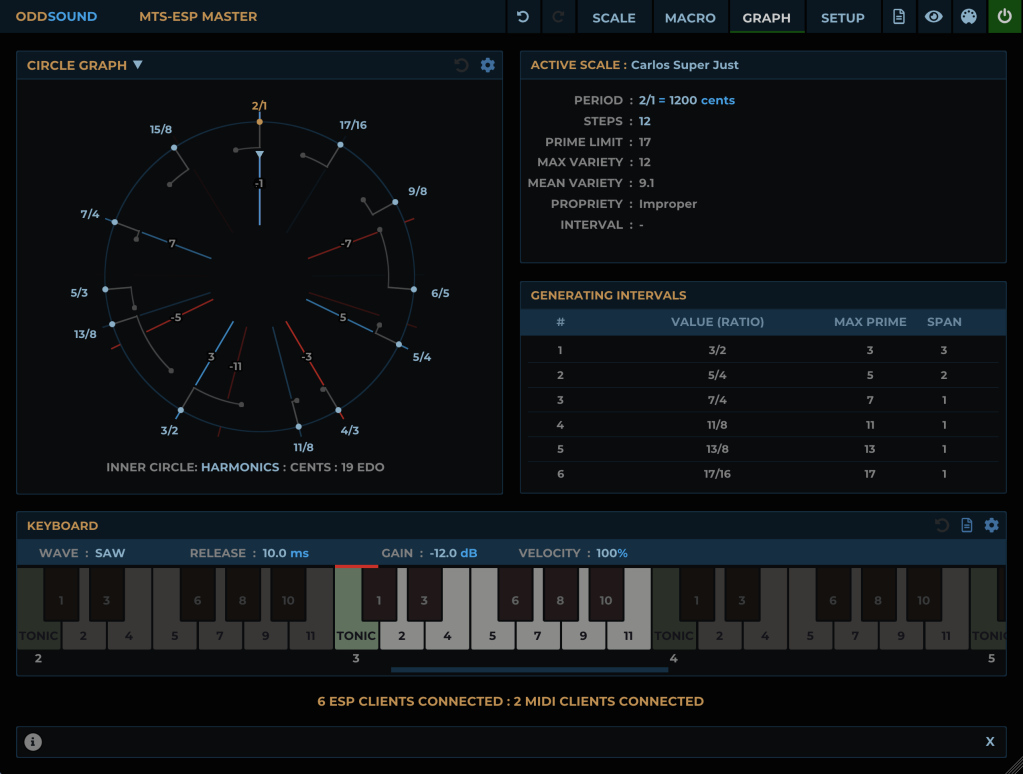
The tools
Richard James (Aphex Twin) and the developers ODDsound worked together to design three tools that address this:
- MTS-ESP, an initiative to standardize a way of letting software talk to each other, including a free and open source library anyone can add to their tools.
- MTS-ESP Mini, a free tool to quickly add support for MTS-ESP tools in your Mac or Windows host of choice – and let you load existing tunings.
- MTS-ESP Suite to edit and explore tunings and work interactively with your software and hardware – whether or not it was built with this support in mind.
And here’s the really good news – you likely don’t have to switch tools to start using this. For instance, I was literally this weekend playing with Modartt’s Pianoteq instrument, which already has an excellent tuning editor built-in. (Yes, that’s right – the much-maligned piano, the instrument that a lot of people blame for dumbed-down 12-TET, is actually not even tuned by piano tuners quite the way this is implemented in most computer software. Cough.)
So the nice thing about this approach is, I can just add the free plug-in and sync up other instruments (or multiple instances of Pianoteq).
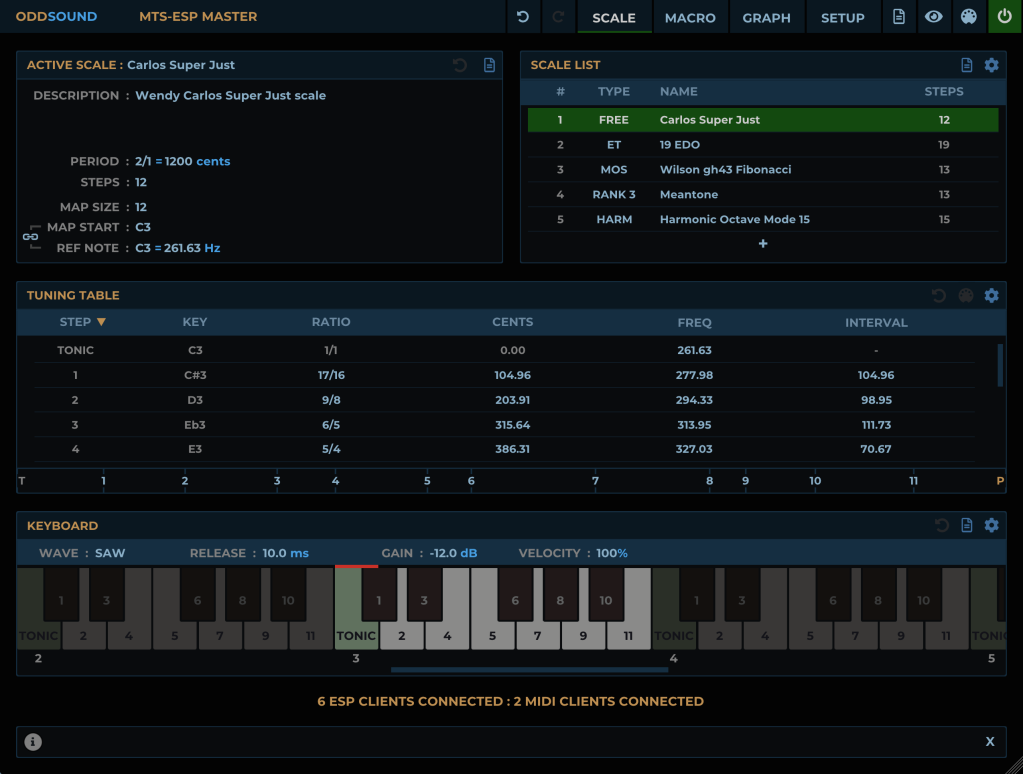
Check the full list of plug-ins, which also includes Xfer Serum, TAL-Sampler, u-he’s Hive 2, Audio Damage’s awesome Continua + Phospher + Quanta, and more. You can also work with Silent Way from Expert Sleepers, which means you can get your software in tune with analog modular gear, as well.
https://oddsound.com/usingmtsesp.php
This isn’t just for supported software, though. You can also use standard MIDI messages (both pitch bend and specialized tuning messages) to work with other software and hardware. The hardware topic is an interesting one, and one to follow up on soon.
You also don’t need, uh, money. You can get started for free:
- MTS-ESP Mini [macOS, Apple Silicon + Intel, Windows]
- TX16Wx Software Sampler
- Surge 1.9 [currently in beta]
Plus you can use the Suite version for free for 30 days without restrictions. It also has Novation Launchpad support so you can play around on hardware. (I suspect that can also be made to work with grids like Push since it’s all just MIDI; I’ll try both.)
It seems like there’s nothing yet on Linux, but the library is BSD-licensed so someone can certainly step in.
(This is funny, too – I’ve never seen a panic button for tuning, but here it is: “Bypass button to return to 12 TET instantly.”)
[Updated: details on what’s there. ]The Suite version also includes optional installs including “experimental” VST MIDI FX for Steinberg hosts, and Max for Live tools for Ableton Live. (The Max tools feature the client implemented as a Max MIDI effect, and one specific to MPE for polyphonic support in Live 11).
There are also a few hundred tuning files, mostly Pythagorean, meantone, and whatnot in MasterScale format including demos of how to use that format and system, and a selection of Scala files from US composer Jacky Ligon. Notably absent are real-world tunings used in most of the world, though import and custom scale creation is possible.
Why tuning
I think it’s worth revisiting the deep dive we did with Khyam Allami. His free browser-based tools can be used to generate tunings you can use with MTS-ESP Mini and MTS-ESP Suite, too, so that’s also relevant.
Also, it’s worth pairing Khyam’s work with this tool, precisely because – see below – it allows access to many tuning approaches that are widely used by musicians and missing here. (There’s a reference to that in the article with Scala, so now is the time to start talking about how to build decentralized community-based tuning efforts!)
The creators on how this works and why it matters
I spoke with the team from ODDSound to tell us more about what they’ve built, and they answered collectively.
Peter: So it seems like part of what makes this special is the ability to bring all your hardware and software together at once, right?
Damon, Dave, Oli: Yeah, I guess there are two things going on – MTS-ESP as a sync technology and the Suite as a way to drive it. The MTS-ESP Master plugin is a rabbit hole all its own and it’s far more expansive than the prior VST side solution, but the MTS-ESP technology is novel. Computers have never had a master tuning table that can be edited and warped in real-time (at 64-bit accuracy) before. The most interesting point is that this is the first dynamic microtuning system – until now you could load tunings into a synth and play it, but this allows you to change any note, chord, or entire tunings in real-time, for all connected gear and plugins. You’re no longer restricted to using a single tuning, you can automate notes in all sorts of strange ways.
How was Richard / Aphex Twin involved?
Rich is a friend of ours (Dave used to live in Cornwall, Damon still does, Oli’s family does). He and Damon have been making microtonal music for years and frequently discussed the problems faced by composers. He’s wanted something like this for a long time, so he was only too happy to spend the time to work it out with us and design a solution. We pointed out to him that this sort of project is commercial suicide, so he offered to help promote it too. 🙂
He demonstrated a lot of the methodology he was currently using and its relative pros and cons. Dave implemented the basics of an auto-configuring retuning system, then Oli jumped on board and took it to extremes.
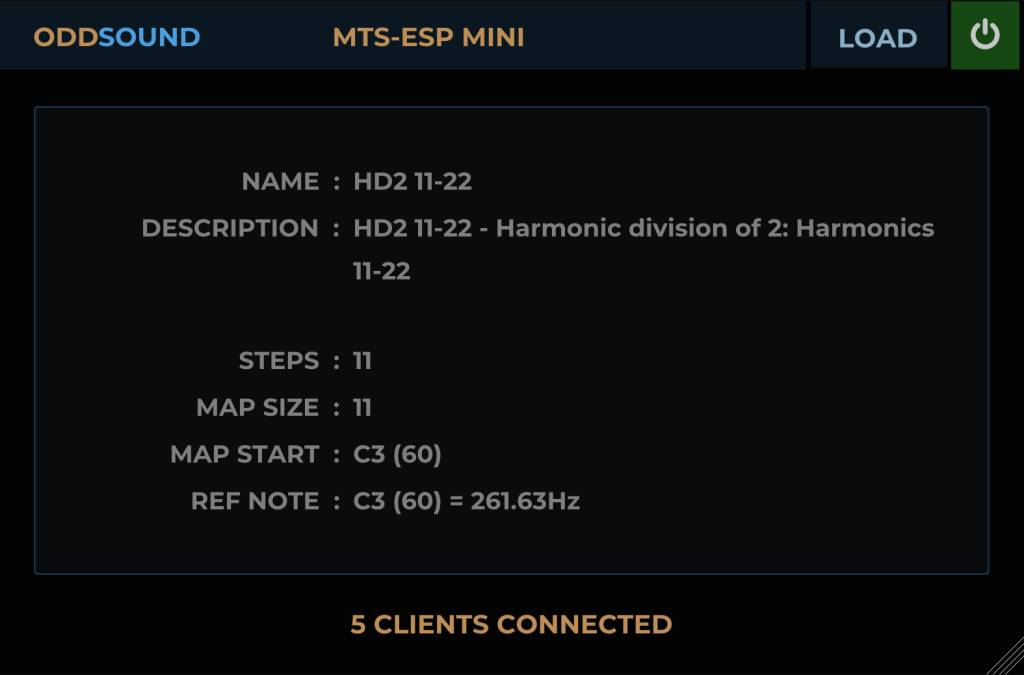
So, you talk about opening up the possibility for other cultures, but then the tuning options provided don’t cover any of that range – you don’t even have maqams, for instance. Is the assumption that folks bring their own?
Our beta testers came with plenty of their own tuning systems but we wanted to avoid having to canonise them and chose to provide some simple and easy-to-compose-with presets. It’s hard enough trying to make an entire industry implement your code, but becoming tuning gatekeepers was a step too far.
It’s having the tools to be able to do this stuff that’s important. You can pick up an instrument and create a scale by ear from it really quickly using the MTS-ESP Suite, that can then be applied to everything. You can take a recording of people singing in local intonations and create a scale from it and be harmonising with it in minutes rather than hours.
[Ed.: Clarification – this answer makes it sound as though there are not presets, but the MTS-ESP Suite does come with a selection of several hundred tuning files that are restricted to more theoretical or academic microtonal approaches, generally. It’s a little puzzling that the press materials talked about decolonizing or de-westernizing music without any accompanying material. You certainly can import your own tunings and I’m meanwhile getting feedback from musicians working in different traditions on how this tool and some others work for them and whether they’re effective solutions. -PK]
The developer respond with an explanation of what is included:
a) Some scales that can get people new to microtuning tinkering straight away (hence a lot of 12-tone ones).
b) Some scales that demonstrate how to use the scale types.
c) Some scales/collections we found interesting but didn’t have in any of our existing downloaded collections.You’ll see more scales added as time goes on though. Also, there is the potential in the code to add new scale types, or algorithms for generating scales, in future updates, whether they be based on ethnic systems or something else.
More broadly in the future though, I’m sure there will emerge an online tuning database that will be accessible from plug-ins like ours. It is desperately needed and there are certainly a number of people thinking along these lines at the moment.
Ed. It seems an ongoing conversation would be about how to share tunings in a way that’s open to communities of musicians, retaining accuracy and context. (“Ethnic” not being the word I’d choose.) All ears on that for anyone with ideas…
What’s the intended audience for the ‘Suite’ versus the free plug-in?
The free plugin is ideal for creators that really just want to work in a single tuning system. They can have the plugin load in their default template, then all MTS-ESP plugins work just like a 12-TET musician would expect, at no cost (because why the hell can’t you do that already?!). If all you want is to work in a specific tuning the free plugin is ideal, it was a gesture to help people that can’t afford to buy software but want to be able to compose electronic music using a different tuning system.
The Suite is a whole new world of composition, it allows a level of note articulation never seen before at 64-bit accuracy. I suppose in this sense the free plugin is to help cultures that have been abandoned by music manufacturers because they didn’t conform to the imperial tuning standard, whereas the Suite is to provide a way of extending the capabilities of electronic music.
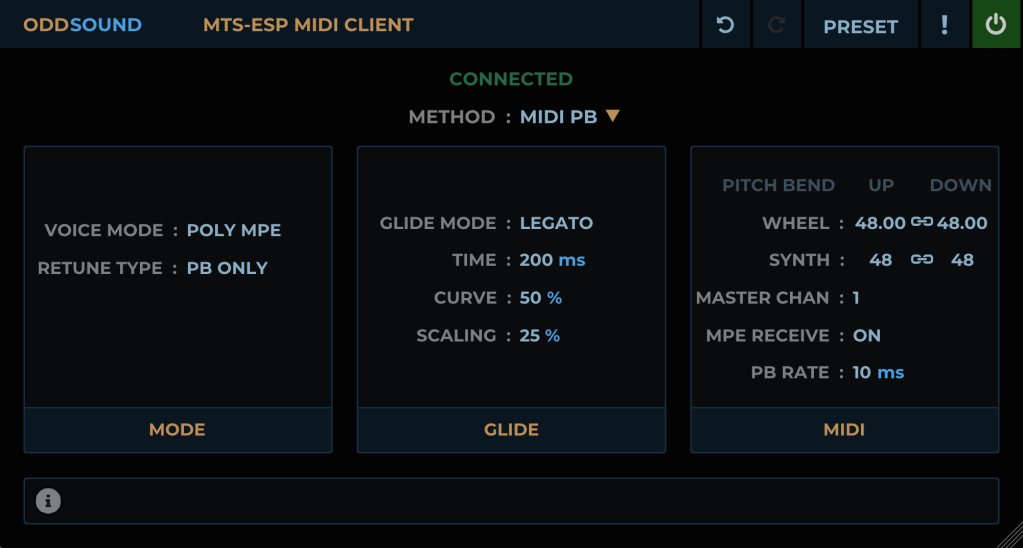
Where do you imagine folks are likely to get started?
The Suite is 100% free for 30 days and it’s a lot of fun, so you might as well grab that, a copy of the Surge beta, and load some of the preset tunings. You can be up and composing in under ten minutes.
I’ve seen the GitHub repository — developers could presumably go there and implement the standard, easiest via the library?
Yes, there’s literally one code file you include to add support for MTS-ESP; for almost all developers, you add that file to your build and use its functions when you need to convert note number to pitch. No need to include the binary, use the master code, any of that – just the one file and you’re in the system and you’re compatible. There’s also enough code provided that a developer could make a competing Master plugin, a few folks are looking to do just that.
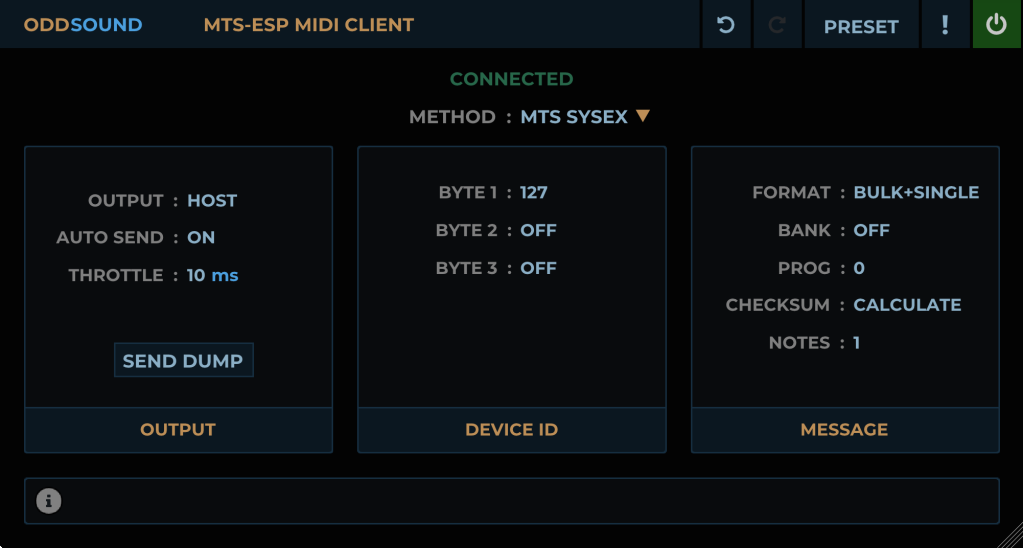
Apart from that, nothing also stopping folks from finally implementing MTS [MIDI Tuning System] on hardware or software, and letting that also talk to the client, right?
Yeah, the suite ships with a Client plugin which bridges between the MTS-ESP core and whatever else you have – it’ll do MTS if you support it, or MPE, or whatever. It’s pretty comprehensive – if there’s a way to microtune an instrument (be that one note at a time with pitchbend, as a last resort), it’ll do it!
Implementing MTS Realtime on hardware makes things work very smoothly. MPE plugins work as well as MTS-ESP plugins, albeit you use the Client to bridge you. Basically Rich has a lot of gear, and we were determined to get it all working 😉
As I understand it, you’re also pushing some best practices for hardware makers, too, right?
The big push on the hardware side is for MTS bulk and single-note messages. Up until now, nothing sent single-note MTS messages, but Rich (Aphex) got Novation, Moog, and Waldorf to implement them over the past couple of years, so there’s a range of hardware that works out the box with the system now. Expert Sleepers are updating their MIDI-compatible hardware (such as Disting EX) with MTS single/bulk changes and we’re talking to several other manufacturers about it now. Anything that supports MPE can be used too, but MTS support is far preferable because it sends fewer messages.
Thanks so much! Well, I do hope this is useful to developers of hardware and software as well as users.
Users, of course, go have a play:
Developers, see here:
https://github.com/ODDSound/MTS-ESP
The juicy bit – and users, this means it’s more likely your favorite instrument by add support soon:
Any plugin that receives and processes MIDI note data can be made compatible with MTS-ESP using the Client API. All it takes is to include libMTSClient.h and libMTSClient.cpp from the ‘Client’ folder in your build.
Time to sharpen our ears and keep learning about tuning!
Bonus: A friend points me to alt-tuner, a very cool-looking tool for Reaper that takes a related approach to dynamically assigning tuning. Reaper users will want to have a look, of course – but mainly, anyone already using alt-tuner, would love to hear your thoughts on how this compares for your use case.